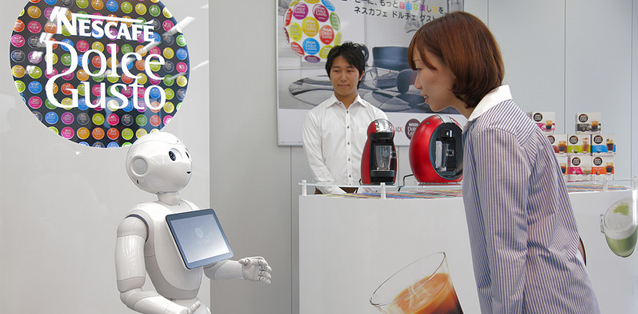
Are Bots the New Apps? Dx3 Showcases Robotics, AI for Marketing Space

 Robots and artificially intelligent software programs were the stars at this year’s Dx3, Canada’s largest digital marketing conference and trade show.
Robots and artificially intelligent software programs were the stars at this year’s Dx3, Canada’s largest digital marketing conference and trade show.
“We’re literally at the beginning of the robotics age,” said Jeff Zajac, CEO of Vaughan-based Solus Robots, “Robots are going to permeate every area of our lives.”
Zajac demonstrated the retail applications of his two models of robot at the conference. The first model has a screen in the middle for ads and a screen at face-level capable of telepresence, meaning video communication with a real human, and the other has a telepresence screen and moving arms. Both travel on wheels and can run pre-programmed routes. Zajac says his vision for the robots is that they could act as customer service representatives chaperoned by a person who worked remotely and controlled several at once.
Zajac’s robots weren’t the only ones charming people on the floor at Dx3. There was also the wildly popular “Pepper,” a humanoid robot built by Aldebaran, which has its headquarters in Paris. Pepper is a short robot with large eyes, a wheeled base and arms and hands with articulated fingers. The robot uses facial recognition to look directly at people and was seen to dance with conference attendees and give them fist bumps.
“Most pieces of tech at retail stores are stationary, reactive devices,” said Jack Grannan, Field Application Engineer at Adelbaran, “Pepper can seek people out.”
Pepper is currently at work at Nescafe stores in Japan and Carrefour Supermarkets in Europe, greeting and communicating with clientele.
In addition to physical robots, software bots and artificially-intelligent solutions abounded.
Fluid XPS, created by NYC agency Fluid, is personal shopping software used by The North Face and powered by cognitive computer IBMWatson. Instead of navigating through the website to find what they need, consumers can simply type answers to questions or make statements and the AI will narrow down the results.
On the other side of the spectrum, Kitchener-based Wriber is a professional tool for copywriters that uses AI to analyse writing and keep the tone, style and brand-positioning on track. The tool judges writing on such aspects as emotional language use, readability and complexity. It can also generate 30 article ideas at a time based on the brand and keywords and inspired by current news items.
In his talk “Why Chat is the Future of Mobile,” Paul Gray, Director of Platform Services at Kik Messenger started out by posing the question, “have you ever had a conversation with a robot?” Though only half the room raised their hands, Gray pointed out that through things like Siri and voice recognition software, virtually everyone had.
Gray also informed the audience that Kik had run several successful marketing campaigns through the use of chat bots and new media storytelling, including one in which users conversed with the protagonist of a movie that was being promoted through the platform.
Concluded Gray: “We’re starting to see the change from an apps-centric world to a bots-centric world.”











